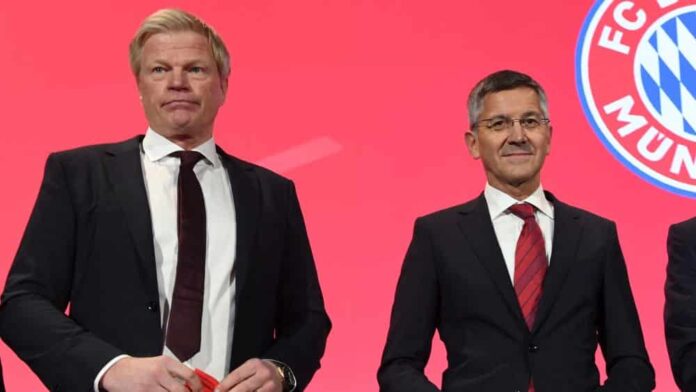Fc Bayern, the critical fans and Qatar Airways: Sylvia Schenk (69) says what conclusions should be drawn from the debate far beyond Munich.
Advisor, consultant, mediator. As a sports and human rights expert for Transparency International Germany, Sylvia Schenk is not only in demand by associations and clubs when it comes to fighting corruption. From 2017 to 2020, she was a member of FIFA’s Human Rights Advisory Council. The lawyer and former Olympic participant (800 m race) is also being heard in the discussions surrounding the 2022 World Cup in Qatar.
In the debate about Qatar Airways as a sponsor of FC Bayern Munich, you were recently quoted like a key witness. Is that you, Ms Schenk?
I can be quoted as a key witness that FC Bayern is dealing with its committed fans in a completely wrong way and is thus not only damaging the club’s democracy, but also its own sponsor Qatar Airways.
The German record champion’s relations with Qatar have long been seen as a problem by some of its fans. Since when have you been directly involved with this issue?
It started with press enquiries parallel to Bayern’s annual winter training camp in 2016 or 2017. Then in 2019 I first became involved with the fact that the club’s presidium simply did not put a motion on the agenda of the general meeting that had been submitted in due time and form. At that time, I ensured that a corresponding motion was immediately put back on the agenda for the next general meeting to signal: The association will not get rid of this issue.
What happened in these two years, or in other words: What was missed?
After all, this motion has now been passed in 2021. However, the time since 2019 has not been used to develop and implement a human rights concept.
Was it now inevitable that there would be this escalation at the General Assembly?
No. The Presidium could have referred to the motion that has now been adopted as a basis for dealing responsibly with the sponsorship by Qatar Airways as well, instead of stubbornly asserting its legal position. Michael Ott’s application, which was not admitted, and his legal resistance with the interim injunction caused the necessary public fuss, which – unfortunately only now – has led to the club’s willingness to talk.
Can you explain the background to this internal FCB conflict in terms of the statutes so that every outsider can understand it?
FC Bayern e. V. is the main shareholder of FC Bayern AG with 75 per cent, which in turn has concluded the sponsorship agreement with Qatar Airways. According to Clause 15, Paragraph 5 of the club’s statutes, the “management of the football division (direct association and outsourced division) … is the exclusive responsibility of the executive committee”. Accordingly, the general meeting of the club is not responsible for sponsorship contracts of the AG and Ott’s application for an interim injunction was rejected. With the motion accepted by the general meeting, but rejected by the executive committee, the association “professes respect for all internationally recognised human rights and advocates respect for these rights”. In addition, the statutes now state that FC Bayern “as majority shareholder of FC Bayern München AG, supports the implementation of the United Nations Guiding Principles on Business and Human Rights”. This is the responsibility of the general meeting, so the executive committee is now obliged to develop a human rights concept and advocate accordingly vis-à-vis the AG.
May a comparatively small part of the membership, although well organised, have such a large influence on far-reaching decisions of an association with almost 300,000 members?
Those who do not come to the general meeting should not complain if motions that have previously been duly put on the agenda are decided there. I would also be surprised if the vast majority of the 300,000 members had anything against the association’s clear commitment to respecting human rights and acting accordingly within the framework of the association’s activities. Incidentally, only individual members of the association take an active role, that is the case everywhere.
But doesn’t that also harbour dangers?
FC Bayern should be happy to have such committed and obviously competent fans and members. If the management takes this on board in a sensible way, it’s a win-win situation for everyone.
What advice would you give to the FC Bayern board?
They should get to work. After all, the DFL task force “Future of Professional Football” also stated in its report published at the beginning of February 2021 how fundamental a binding human rights concept is.
Keyword: communication. Only recently, the now ex-chairman of the board Karl-Heinz Rummenigge spoke honestly and clearly about the importance of this sponsorship.
The financial significance does not change the human rights responsibility of FC Bayern AG as a globally active business enterprise. The UN Guiding Principles on Business and Human Rights do not stand in the way of such sponsorship. The AG could also commit Qatar Airways to the UN Guiding Principles by contract and ensure that they train female pilots, have women in management positions and that, for example, the working conditions of the workers employed for in-flight catering or cleaning comply with international standards. I am sure sponsors like Adidas, Allianz, Telekom are already doing this in their supply chains. From 2024, FC Bayern AG will have to do this anyway under the new supply chain law in Germany.
Rummenigge also referred to the fact that fans of one of the most successful clubs in the world continue to expect an absolute top team.
When Karl-Heinz Rummenigge brings the financial side to the fore like this, he unnecessarily reinforces the impression that football is always about money – no matter at whose expense. Football, if it lives up to its responsibility in its own business, can advance respect for human rights and still earn money.
Should the new CEO Oliver Kahn now declare this a top priority or the club president Herbert Hainer?
The best thing is for both to work hand in hand. After all, it’s not just about foreign relations. We also have human rights risks in Germany in the league. These range from sexualised violence in the stadium to the working conditions of the security forces to dealing with injuries, especially concussions, and the sometimes excessive use of painkillers by professionals. At FC Bayern e. V. I did find something on child protection on the website, but nothing else.
What advice do you have for fans who are up in arms about this?
Keep calm, network with other stakeholders and stay objective on the issue.
Don’t you think that the majority of Bayern fans, whether members or not, are much less critical of the partnerships with Qatar?
That may be so, only criticism doesn’t help. But as far as the attitude towards human rights is concerned, I have a lot of confidence in the majority of the fans?
Can the industry leader of the Bundesliga still play an exemplary role here with regard to the consideration and application of the UN Guiding Principles on Human Rights also in a sports enterprise?
It would be a great signal if the club and the AG took action. This could give momentum to the measures taken by the DFL as a result of the Taskforce Report and, in view of FC Bayern’s reach, initiate a differentiated discussion on human rights responsibility both internationally and nationally.
As a Transparency International expert, how do you rank the state-owned Qatari airline in your organisation’s “core business”?
In the Corruption Perception Index, Transparency International’s corruption ranking, Qatar is in 30th place with 63 out of 100 points, Germany is in 9th place with 80 points, and the USA is in 25th place with 67 points. These are not huge differences. I am not aware of any corruption case involving Qatar Airways. The company’s website says a lot about the CO2 footprint, i.e. environmental issues, and social aspects are also briefly mentioned, but not explicitly human rights. This is exactly where FC Bayern could start as a sponsoring partner.
Is Munich a proxy conflict within the overall debate about the 2022 World Cup?
It’s part of the overall discussion, but FC Bayern has its own responsibility.
So it’s fundamentally about new standards and values in partnerships between clubs and donors?
Yes, but not only for professional clubs. ESG, i.e. Environment – Social – Governance, are now a key assessment criterion for financial investors worldwide. If professional sport does not want to become dependent on dubious financiers such as oligarchs or autocratic rulers who use state funds, there is no way around applying ESG criteria. The DFL taskforce report also sees it that way.
Is the attention, not to say mindfulness, of the public greater today and in the future than football in particular has known so far? Are we dealing less with a zeitgeist and more with a turning point in time?
When I look at the current global challenges of politics, as they have also found expression in the coalition agreement of the “Ampel”, then the fight against climate change is integrally connected with social security and the protection of human rights, and governance in the sense of an appropriate rule of law-oriented leadership is also part of this.
In one year, the tournament in Qatar will already be over. How do you assess the human rights situation today and the ongoing debate about it in public?
The debate as such is helpful. Without the awarding of the World Cup and the criticism it provoked, there would have been no pressure on FIFA. Even if FIFA’s decision at the time was wrong because the human rights situation was not taken into account from the beginning, in the meantime, through the intensive work of the building trade unions, some progress has been made with regard to the safety of the building sites and the working conditions. This is still a long way from reaching Western European standards; there is still a lot to be done, especially for domestic workers and women’s rights in general, as well as with regard to the situation of homosexuals. But Qatar is ahead in the Gulf region. Above all, we should not abandon migrant workers, but demand the further implementation of the measures that have been introduced.
Why is it from Germany that the loudest criticism of a World Cup in Qatar comes?
In Germany, we sometimes tend to think in black and white and don’t get involved in developments that take time. In addition, processes of sustainability and change management, including the UN Guiding Principles, are not as widely known in Germany as they are in discussions abroad. We now have to go through a transformation process ourselves in the economy, politics and society if we want to stop climate change – I hope that we are more patient with ourselves than with the Qataris.
What must the DFB learn from this today with a view to EUR0 2024? Or do the Germans do everything better at big events anyway?
The DFB has a human rights concept, and the preparations for the EURO take the UN Guiding Principles into account. In Germany, too, we have racism and sexualised violence in stadiums or precarious working conditions, for example in the construction, cleaning and security trades. The biggest problem is UEFA. On 16 December, UEFA adopted a sustainability strategy that falls far short of international standards for human rights. FIFA and the DFB have long since gone further. UEFA does not take any responsibility for human rights in its core business, but is mainly engaged in cosmetics.







